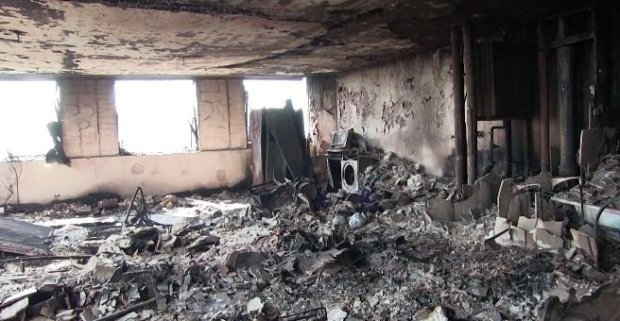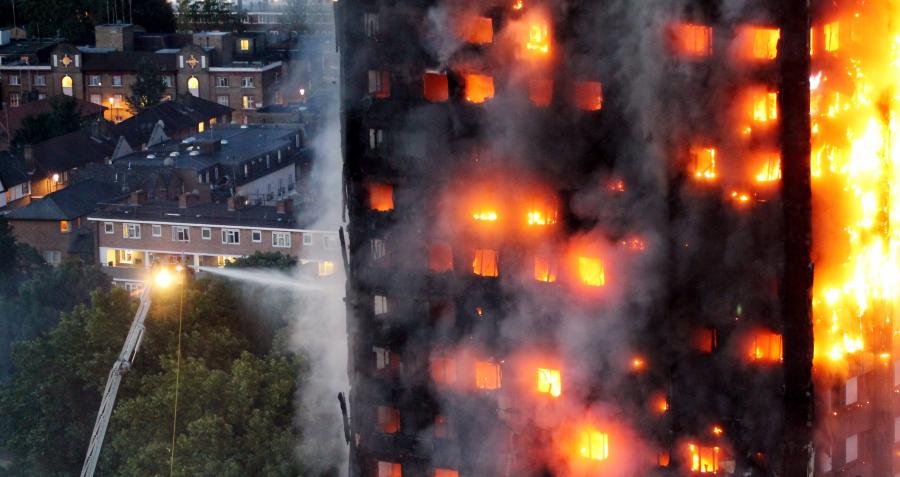
On 14 June 2017 approximately 250 firefighters fought the Grenfell Tower block fire in West London, over 60 hours. The fire started on the fourth floor of the 24-storey, 220 foot high building in a fridge freezer, and cladding on the building’s exterior is believed to have rapidly accelerated the spread of the flames. It caused total devastation, with some experts saying it was the biggest fire London has seen since the World War II.
At present the death toll is thought to be at approximately 80 people, although a final death toll is not expected this year. The emergency services managed to rescue 65. Inquests have been opened, the investigation continues, but as people attempt to return to their lives – what about the mental wounds suffered by the emergency services who went back in time and time again to rescue the people of Grenfell Tower?
So, 19 hours after starting our night shift the members of Red Watch made it back to the Fire Station. Time to try and rest… in four hours’ time we will be on duty again.
Unprecedented events
The London Fire Brigade stated very quickly that the Grenfell Tower fire was unlike anything seen in recent history in the UK. The fire spread so quickly that almost immediately the cladding on the newly refurbished building was brought into question.
London Fire Commissioner Dany Cotton said: ‘This is an unprecedented incident. In my 29 years of being a firefighter, I have never, ever seen anything of this scale.’
With Fire Brigades Union’s general secretary, Matt Wrack, adding: ‘This should not be happening, that’s the horrible aspect of this incident.’
A firefighter who attended the blaze, who has worked for 27 years in fire and rescue, said the fire was the largest that London had seen since the Blitz during World War II.
“I was at that fire from 2am until 10am,’ he said. ‘When we turned up we could only see one side on fire but in a couple hours that whole building was engulfed.
“It was like The Towering Inferno and 9/11 rolled into one. To get in the building we were running a gauntlet of flying debris, and the police were using their riot shields.

Credit: Met Police
“Me and my crew were involved in rescues. On the stairwells, on the way up to certain flats we were detailed to go to by fire survival guidance, people were coming down the stairs in smoke.
“I don’t know how they were breathing. We had breathing apparatuses on and we were basically carrying them down the stairs,” he told LBC.
Physical and mental exhaustion
Another firefighter’s account was shared on social media by fellow firefighter Pete Drummond. It spoke of the total physical and mental exhaustion of going into the tower to rescue people, and the fear of coming outside and seeing more and more of tower on fire, before gathering thoughts to go back in.
“Everyone is looking round at each other listening to this officer try to motivate us into action again. He didn’t need to though. We are ready for it! This is what we train for.
“Those colleagues who a little while ago were collapsed and broken from on the grass from their first entry are back up, ready, stood in full kit waiting for their orders to go in again.”
Mental health guidance and support:
It continues: “Around the 9th floor we lost all visibility and the heat was rising. Still we continued up and up through the blackness. We reached what we believed to be the 19/20th floor but there was no way to tell. It was here where we found a couple trying to find their way out, panicking, choking, blinded by the thick toxic air.

Image: FBU
“A quick gauge check showed us that the amount of floors we’d climbed had taken its toll, we were getting low on air. There’s no way we could make it to the 23rd and back to the bridgehead.
“The couple were shouting and screaming at us through the coughing, trying to tell us there were five more people on the floor above!
“Now I had horrible decisions to make and a very short amount of time to make them.”
The account ends: “So 19 hours after starting our night shift the members of Red Watch made it back to the Fire Station.
“Time to try and rest.. in four hours’ time we will be on duty again”
Other emergency services
Fire and rescue services from across West London were joined by many other emergency services – some of whom will be working throughout the investigation, including the Metropolitan Police Disaster Victim Identification (DVI) team, Urban Search and Rescue (USAR) modules, and the London Ambulance Service Hazardous Area Response Team (HART).
All of the emergency services have been faced with many situations that go beyond the call of duty. And now, one month on from London’s worst fire in decades, they face new pressures each day. As with all workers, the emergency services have a duty of care for their employees’ health, safety and wellbeing – so where can we begin in helping our blue light professionals in dealing with such huge trauma.
Mental health support for the emergency services
It was absolutely horrific at Grenfell, and it’s still very very raw. I have seen some really horrible things that I’ve never experienced seeing before and hope I will never see again. It will stay with me all my life. We were offered a session with a counsellor which I took up, and it did help, but nothing will get those images out of my mind.
Speaking to the firefighters of Grenfell Tower, Dr Jill Tolfrey, chief executive of The Fire Fighters Charity, said: “We know that incidents like this can have a serious and lasting impact on the emotional wellbeing and mental health of firefighters and control staff.
“Every day you deal with situations and see things that no one should ever have to see. However, you approach this task with unfaltering professionalism and, as we have seen at Grenfell Tower, with selfless determination to save lives and to help those in the local community.
“Our role as your charity is to ensure that we can support you, if and when you need help to overcome physical or psychological trauma yourself. Our Services Access Line – 0800 389 8820 – is open from 8am to 6pm Monday to Friday and from 9am to 5pm on Saturdays. We can provide advice, information and support to any fire and rescue service personnel affected by this or any other incident they may attend. So please do give us a ring if you need to.”
The charity offers the following services to those fire service personnel affected by the Grenfell Tower fire:
- Psychological support: a dedicated team of psychological therapists who can support firefighters as part of an intensive psychological rehabilitation programme
- Recuperation breaks
- Advice, information and support
Mental health charity, Mind, delivers mental health support to staff and volunteers across search and rescue, police, fire and ambulance services in England and Wales through the Blue Light Programme.
The programme helps people to take care of their own mental health and support others, particularly after witnessing and attending to traumatic events.

Credit: London Fire Brigade
Speaking to SHP, Faye McGuinness, Blue Light programme manager at Mind, said: “It’s worth remembering that issues don’t always arise immediately after traumatic events such as these, it can take time for them to come to the surface, so ongoing support needs to be available. That’s why Mind is helping train line managers in spotting the signs that a colleague might be struggling with their mental health, as and when problems present themselves.
“In the last few months we’ve seen an unprecedented atrocities in quick succession such as the recent terrorist attacks in London and Manchester and the horrendous incident at Grenfell Tower. Incidents such as these bring into sharp focus the hugely challenging and dangerous jobs our 999 staff and volunteers carry out, day in, day out, to keep the public safe.
“Historically, there has been a ‘macho’ culture within emergency services, which tend to be male-dominated. There’s a perception that regularly being exposed to traumatic situations makes you immune to developing mental health problems, but that’s not the case.
“In fact, our survey of over 1,600 staff and volunteers across the emergency services shows that nearly 9 in 10 have experienced stress, low mood or poor mental health while performing their role, and a shocking one in four said that they had contemplated taking their own lives. Staying silent only makes things worse, so we encourage all employers to create environments where people can talk openly about issues like stress, anxiety and depression.”
SHP contacted the Samaritans who said its volunteers have been “offering and giving support to anyone affected by the Grenfell Tower fire.
Cuts to mental health support
Last month, the Fire Brigades Union, said that “counselling services available to the firefighters who responded to the Grenfell Tower fire were drastically cut back under Boris Johnson’s leadership as the former Mayor of London.”
It added: “The number of counsellors trained to help firefighters process the traumatic scenes they witness on the job in the London Fire Brigade was cut from 14 to just 2 under Johnson, who also took 13 fire engines off the run.”
Matt Wrack, general secretary of the Fire Brigades Union, said: “The absolutely devastating scenes that firefighters witnessed at Grenfell will stay with them for the rest of their lives. They are heroic men and women who just get on with the job and don’t complain but at the end of the day, they’re human and will be affected by what they see.
“The priority today is to make sure that everything possible is done to take care of their mental wellbeing after such a horrific disaster. We need more counsellors to look after them, not less.”
Where to find help:
Whether you deal with traumatic situations in your day-to-day job or not, it’s important to look after your wellbeing, as well as that of your colleagues.
If you’re struggling with your mental health, try to open up to someone you trust, such as a close friend or family member. Often simply talking about it helps.
If the problem continues and begins to interfere with everyday life, speak to your GP, who can talk you through the support that’s available.
If you, your friend or family member works of volunteers within a 999 service, you can also get help from Mind’s confidential advice and support service, Blue Light Infoline, by calling 0300 303 5999 (Monday-Friday, 9am-6pm), emailing: [email protected] or texting: 84999.
The website – www.mind.org.uk – also has a great deal of information on mental health problems including post-traumatic stress disorder (PTSD).
Fire Safety in 2023 eBook
SHP's sister site, IFSEC Insider has released its annual Fire Safety Report for 2023, keeping you up to date with the biggest news and prosecution stories from around the industry.
Chapters include important updates such as the Fire Safety (England) Regulations 2022 and an overview of the new British Standard for the digital management of fire safety information.
Plus, explore the growing risks of lithium-ion battery fires and hear from experts in disability evacuation and social housing.





